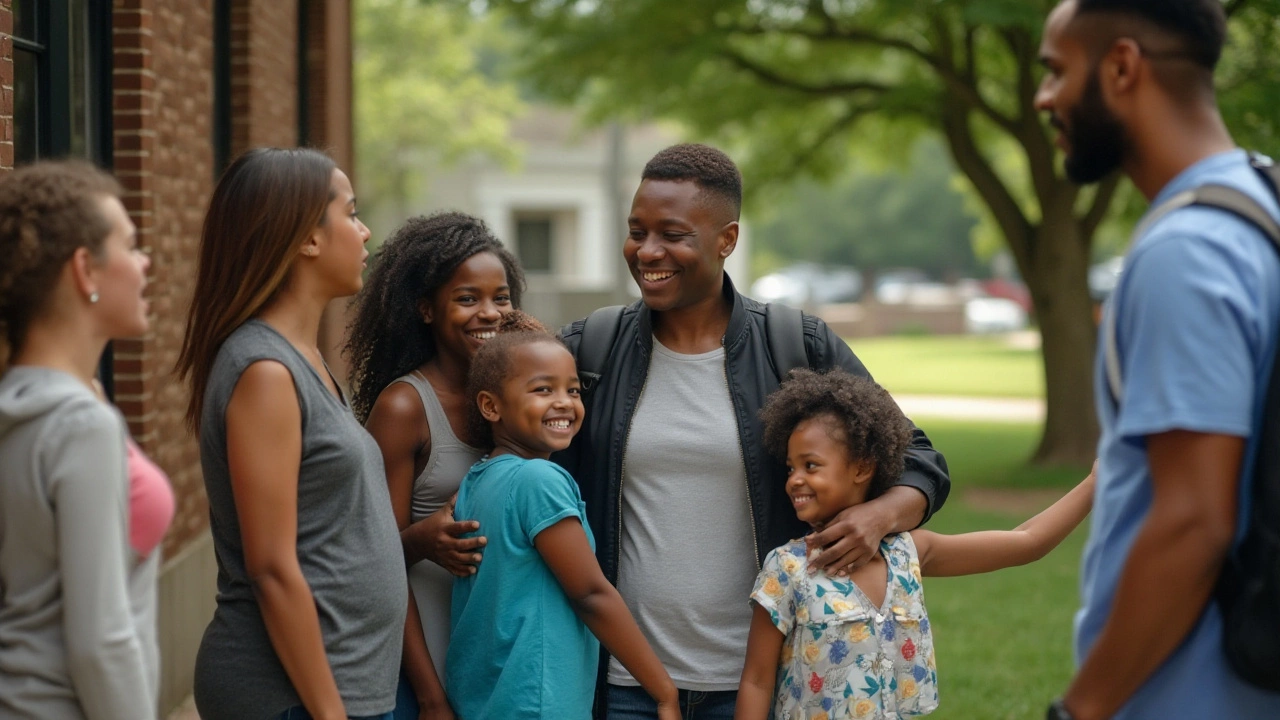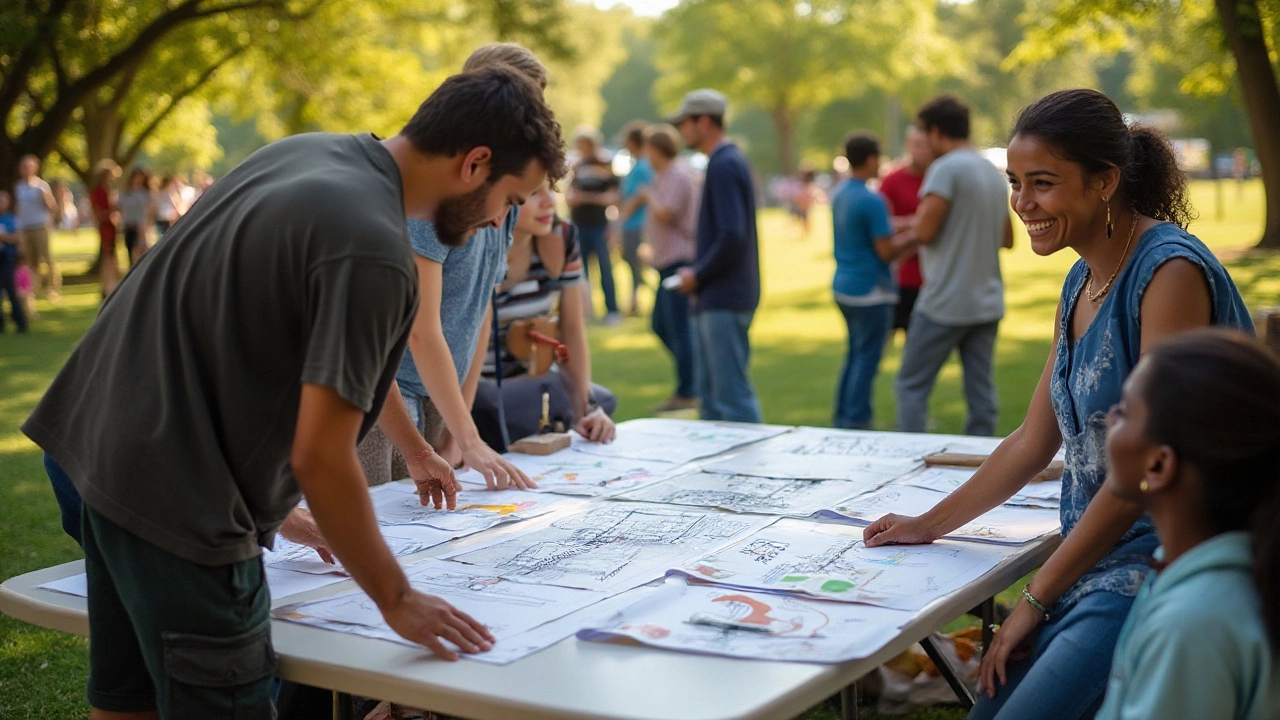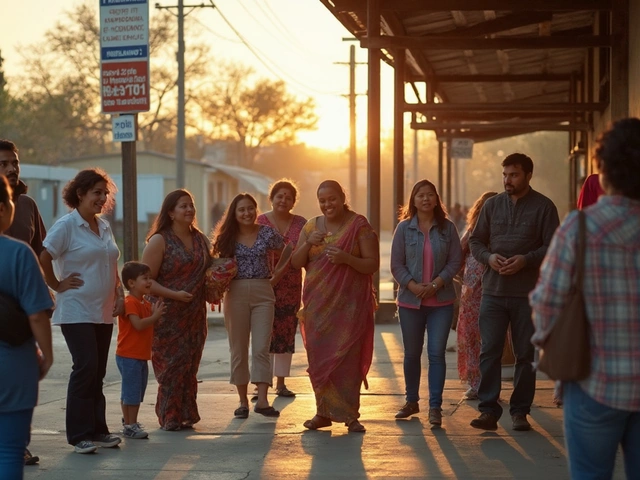In the heart of the American South, Arkansas grapples with an ongoing challenge that calls for both compassion and action: homelessness. This ever-present issue is tackled head-on by organizations that do more than just provide temporary shelter—they aim to offer tangible solutions and hope for a brighter future.
These dedicated groups operate with a profound understanding of the complexities surrounding homelessness, recognizing that it’s not simply a lack of a roof over one's head, but a multifaceted crisis requiring comprehensive care and innovative strategies. These community pillars are not only helping those in immediate need but are also paving pathways toward sustainable living.
Explore how these organizations are transforming lives, the unique methods they employ to combat homelessness, and the powerful impact of their work across Arkansas. As we delve into their stories and successes, there’s much to learn about the actions taken and the continuing journey to ensure every Arkansan has a place to call home.
- Arkansas' Homelessness Landscape
- Key Organizations at the Forefront
- Innovative Housing Solutions
- Community Support and Engagement
- Success Stories and Impact
- How You Can Make a Difference
Arkansas' Homelessness Landscape
Arkansas, with its lush rolling hills and historical charm, presents a facade of serene beauty. Yet beneath this picturesque exterior, the state battles a complex issue of homelessness that affects thousands. Despite its relatively small population, Arkansas experiences a significant rate of homelessness, influenced by factors as diverse as economic challenges, mental health issues, and lack of affordable housing. These challenges contribute to the hardships faced by individuals and families striving to find stability and security in their lives. As of the latest data, close to 2,700 people find themselves without a regular place to call home at any given time, a testament to the urgent need for comprehensive solutions.
One poignant insight into this problem is the economic pressure exerted by rising costs of living, juxtaposed against limited job opportunities in certain sectors. The housing market has seen a noticeable surge, making affordable housing even more unattainable for low-income families. This gap in affordable housing not only strains individuals but also stresses the statewide social services. The rural nature of much of Arkansas compounds the issue, as resources are often centered in more urban areas, leaving those in remote regions with fewer options for immediate assistance.
Historically, homelessness in Arkansas has been a cyclical challenge, with patterns emerging that reveal the intricate links between health, employment, and housing. Mental health plays a pivotal role, often intertwined with addiction, creating barriers to consistent employment and housing retention. As these individuals cycle in and out of temporary arrangements, shelters can become overflowed, creating a strain on these indispensable institutions. Addressing the root causes of homelessness requires the state to change its approach by moving from reactive to proactive strategies.
Some communities have begun to adopt innovative solutions, such as the Housing First model, which prioritizes providing permanent, stable housing as a primary step. This approach has been adopted successfully in parts of Little Rock, demonstrating significant improvements in both individual well-being and community health overall. Emphasizing housing as a core human right rather than a privilege presents a shift in perspective essential to tackling homelessness effectively. Another promising development is the growing emphasis on collaborative partnerships between state agencies, non-profits, and community members, which have formed a formidable front in the fight against homelessness.
An insightful remark by Andrew Hummel, director of social services at a leading Arkansas university, captures the essence of this struggle:
"Addressing homelessness is about recognizing the humanity in every individual. It's about acknowledging that everyone, no matter their economic condition, deserves the dignity of a place to call home."His words resonate deeply in a state where cultural values of hospitality and community are cherished yet tested by the realities of economic disparity.
Key Organizations at the Forefront
Arkansas showcases remarkable organizations that actively tackle homelessness, each bringing unique approaches and unwavering dedication to support those most in need. One of the most prominent names in this arena is the Arkansas Homeless Coalition, a leader in strategic efforts to combat homelessness statewide. Their passionate mission is rooted in the belief that everyone deserves a safe, stable place to live. Through collaborative partnerships, they work tirelessly to provide not merely beds for the night, but comprehensive services catering to the physical, mental, and emotional well-being of individuals facing homelessness.
The Little Rock Compassion Center, positioned at the forefront in the capital city, extends beyond conventional shelter services. This organization emphasizes rehabilitation and empowerment, offering vocational training, addiction recovery programs, and life skills workshops. By addressing the root causes of homelessness, they instill hope and provide the tools necessary for personal transformation. It's incredible how initiatives like these can influence long-term change, turning crisis into opportunity. As Reinhold Niebuhr once wisely reflected,
"Nothing worth doing can be achieved in our lifetime; therefore we must be saved by hope.”
Another noteworthy initiative is the Continuum of Care program, a regional approach that coordinates a range of services — from emergency shelter to permanent housing solutions. This collaboration is designed to address the full spectrum of housing needs and is instrumental in securing federal funding, advocating for policy reform, and tracking community progress. It's said that in 2023 alone, Continuum of Care successfully aided over 1,000 individuals in obtaining permanent housing solutions across the state.
In Northwest Arkansas, the 7hills Homeless Center is a beacon of respect and dignity, focusing on outreach and sustainable change. With a dedicated day center and a transitional apartment program, they offer individuals the stepping stones to regain independence. Highlighting their impactful contribution, the 7hills staff donates countless hours to ensure that not just the immediate needs are met, but that clients have access to job fairs, healthcare services, and financial literacy programs, pushing their efforts beyond traditional shelter models.
These organizations reflect a broad tapestry of coordinated care and dedicated effort that includes government support, non-profit vigor, and community involvement. Volunteers, staff, and donors form the backbone of these initiatives, providing crucial resources and emotional support. The Arkansas community's response to homelessness shows that when every citizen contributes their part, remarkable transformations can occur, painting a brighter future for thousands.

Innovative Housing Solutions
Across the scenic landscapes of Arkansas, the effort to tackle homelessness has given rise to some truly innovative housing solutions that are reshaping lives and communities. One of the most transformative approaches is the concept of 'Housing First.' This model prioritizes providing permanent housing to the homeless without preconditions, subsequently addressing other social and health issues. Studies have repeatedly shown this strategy to significantly reduce homelessness rates, emphasizing its effectiveness.
Establishing tiny homes has also emerged as a creative method to provide affordable and sustainable living spaces. These compact dwellings not only offer shelter but foster a sense of belonging and community among their inhabitants. Organizations from urban centers to rural areas are leveraging this model to great effect, tailoring it to fit local needs and resources. The tiny house villages integrate shared resources and communal areas, encouraging interactions that combat the isolation many homeless individuals face.
A notable mention in this regard is the Our House project in Little Rock, which has developed a comprehensive program combining emergency shelter, transitional housing, and supportive services. The aim is to equip residents with the skills and resources they need for successful reintegration into society. By integrating job training, childcare, and health services, they deliver a potent mix of support that's proven to uplift individuals from crisis to stability.
Another pivotal initiative is the collaborative approach taken by community land trusts, where collective ownership of land allows for the development of affordable housing options. This innovative approach not only provides affordable homes but sustains long-term housing solutions by keeping land costs stable and manageable. Through these trusts, residents gain more than just a roof over their heads; they secure a lasting investment in their community.
"Housing is not just a structure; it's a foundation for stability," noted a representative from Arkansas Community Foundation. "Providing secure and stable housing is the first step towards addressing many other social determinants of health."
In addition to these efforts, transitional housing programs play a crucial role. These programs provide a bridge between short-term housing emergencies and permanent housing solutions. By incorporating educational opportunities, mental health support, and addiction recovery programs, they address the roots of homelessness, offering a holistic path towards recovery and independence.
Each of these approaches represents the dynamic and multi-faceted strategies employed across Arkansas to confront homelessness with creativity and empathy. As these solutions take root, they offer hope and a blueprint for other communities facing similar challenges, demonstrating that with the right mix of innovation, dedication, and community spirit, lasting change is not just possible, but inevitable.
Community Support and Engagement
Rooted in the heart of change, community support and engagement in Arkansas plays a pivotal role in the battle against homelessness. By mobilizing local resources and fostering a spirit of collaboration, these initiatives ensure that help extends beyond institutional walls. In many towns and cities across Arkansas, grassroots movements breathe life into larger efforts, transforming the landscape of aid and hope. Residents often come together, unified by the belief that everyone deserves a fair chance at stability and belonging, rallying around shelters and outreach programs. The fusion between communities and organizations forms a formidable front against the odds, where every small action counts toward a broader solution.
To combat such a significant challenge as homelessness, innovation is key. Local businesses frequently partner with shelters and aid groups, providing employment opportunities and financial resources that empower individuals in transition. Volunteering plays a critical role too, as countless Arkansans dedicate their time and skills to improve the lives of their neighbors. This human touch—combined with professional assistance—creates bonds that go beyond mere charity, encouraging life-changing stories of recovery and empowerment. An inclusive environment strengthens societal fabric and shows that a caring network can drive positive change.
A significant aspect of these initiatives is public awareness, where campaigns spotlight the realities of homelessness, dispelling myths and fostering empathy. “When communities understand the nuances of homelessness, they’re better equipped to contribute meaningful support,” says Emily Johnson, a social worker from Little Rock.
"Public awareness and education are crucial," Johnson explains. "Change happens when people understand the issues at hand and realize that they can make a difference."This enlightenment is crucial for turning passive empathy into active support, from providing daily necessities to advocating for systemic change that addresses the root causes of homelessness.
Interesting collaborations have emerged, such as schools incorporating awareness into their curricula, thus nurturing a generation particularly attuned to issues of social justice and community care. These educational efforts extend beyond formal teaching; interactive awareness events, donation drives, and student-led initiatives bring a dynamic form of engagement that has a lasting impact. Every event serves as both a learning opportunity and a personal connection to the wider community, igniting passion within young hearts to become lifelong advocates for those in need.
Moreover, faith-based groups and civic organizations amplify their efforts, not merely reaching out through traditional charity but engaging in holistic approaches that address the social and emotional dimensions of homelessness. These organizations set a powerful example of compassion in action, where engagement spans both formal and informal interaction throughout the week. Regular neighborhood meetings, community gatherings, and public forums are held to discuss challenges and strategize solutions collectively, ensuring that every voice is heard and potential solutions are embraced.
The vibrancy of community support in Arkansas stems from its adaptability and resilience. As the landscape of homelessness changes, so too do the methods of outreach and assistance. Staying dynamic allows organizations to meet diverse needs with precision and empathy. As residents come together to face these challenges, the spirit of cooperation illuminates the path forward, reassuring those on the fringes of society that they are not alone. Through these tireless efforts and unwavering hope, Arkansas continues to weave a safety net that promises shelter, dignity, and the possibility of a better tomorrow.

Success Stories and Impact
In Arkansas, the journey to combat homelessness is illuminated by numerous success stories that inspire and demonstrate the power of perseverance and community support. One such tale centers around a program in Little Rock, where collaboration between local shelters and social services has led to remarkable outcomes. Through strategic partnerships, they have managed to decrease chronic homelessness significantly, helping individuals find stable housing and regain control over their lives. These stories of transformation often begin with a helping hand extended at a critical moment, and through persistent effort, evolve into narratives of self-sufficiency and renewed hope.
Many individuals have walked difficult paths plagued by homelessness, only to find resilience and support that help them rewrite their stories. Consider the case of a young mother who, after losing her job and house, found refuge in a local shelter. The shelter not only provided a temporary roof but also offered access to job training programs and childcare services. With these resources at her disposal, she was able to secure employment, save money, and eventually move into permanent housing. Her story is just one of many where life roars back from adversity with the aid of such compassionate initiatives.
In addition to these individual stories, the broader community impact of these organizations is also worthy of attention. The deliberate efforts of shelters and support services have resulted in a decrease in the number of homeless individuals across Arkansas, painting a picture of a community that stands united against adversity. These organizations have successfully integrated innovative approaches like educating the public about homelessness, generating empathy and understanding, which in turn encourages more proactive support from local residents.
"Homelessness is more than lacking a place to live; it's about losing a sense of belonging," says John Doe, a dedicated volunteer at one of the prominent shelters. "Our work is a testament to what communities can achieve when they come together to support one another."
Efforts to end homelessness have seen tangible results, including a significant uptick in volunteerism and donations, which give these organizations the necessary resources to extend their reach. The sheer motivation and kindness from people contributing time and money is a powerful indicator of the societal shift towards alleviating homelessness. Statistics from the past decade suggest an impressive reduction in street homelessness, showcasing the effective strategies and solidarity driving these changes. Indeed, the unified pursuit of lasting solutions marks a beacon of hope in tackling this enduring social challenge.
Arkansas homelessness initiatives are marked by their successful collaborations and steady progress, providing a template that other regions might emulate. Anchoring their efforts in compassion and strategic planning, these success stories convey the profound impact that thoughtful interventions and community solidarity can have on reversing the tide of homelessness, proving that hope and action can bridge even the widest gaps. These narratives not only uplift those directly involved but also ripple outwards, transforming societal perception and engagement in addressing homelessness.
How You Can Make a Difference
Addressing homelessness in Arkansas requires more than just organizational support; it thrives on the active participation of community members who are willing to lend a hand. Individuals can play a crucial role in enhancing the efforts of dedicated groups working on the ground. One of the most straightforward ways to contribute is through volunteering. Whether you have skills in cooking, teaching, or administration, there's always a role you can fill at local homeless shelters. These shelters often rely on volunteers to help serve meals, sort donations, or assist in job training workshops. Every bit of your time and effort can significantly impact those seeking stability and a fresh start.
Supporting policies that aim to alleviate Arkansas homelessness is equally important. By staying informed and voting on initiatives that fund housing or increase resources for mental health and addiction services, you can voice your support for comprehensive solutions. Advocacy doesn't stop at the ballot box. Engage with local representatives to prioritize homelessness in their agendas. Community support can be harnessed effectively when people show that they care about these pressing issues and demand action from policymakers.
Another meaningful way to make a difference is through donations. Financial contributions to organizations can help them expand their capacity and provide more extensive services, from job placement programs to mental health counseling. If you're unable to provide monetary donations, consider giving items such as clothing, toiletries, or food. These donations are a lifeline for many shelters and outreach services, allowing them to allocate funds where they're needed most.
"The greatness of a community is most accurately measured by the compassionate actions of its members." – Coretta Scott King
Raising awareness is also a powerful tool. Share stories and facts about homelessness on social media, or create conversations within your circles to dispel myths and promote understanding. The more people are informed, the more likely they are to contribute positively to the cause. Many people do not realize the extent of homelessness or its underlying causes, so education can lead to greater empathy and support for systemic changes.
Encouraging local businesses to participate in job training or employment opportunities for the homeless is another significant avenue. When businesses collaborate with non-profits to provide internships or permanent positions, they offer individuals a chance to rebuild their lives with dignity. It demonstrates socially responsible practices that benefit the whole community while addressing housing solutions at their core.
Think about organizing community events that bring people together for this cause. Host a fundraiser, a charity run, or a donation drive. Not only do these events raise much-needed funds, but they also serve as reminders of our collective responsibility. Each of us has the potential to contribute to eradicating homelessness, making Arkansas a more compassionate state for all its residents.





